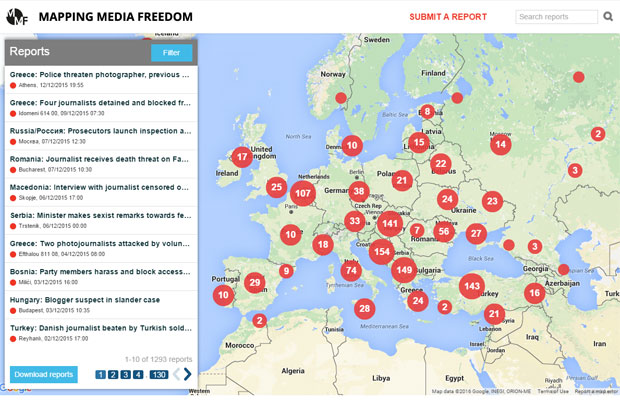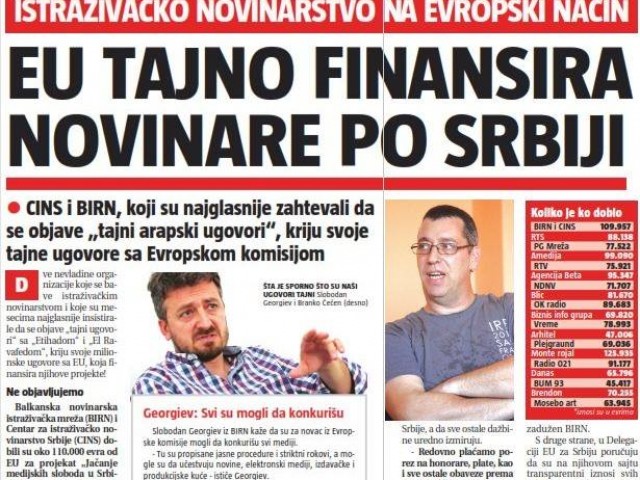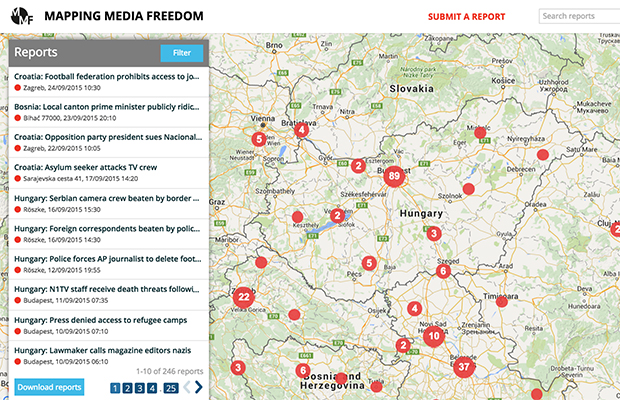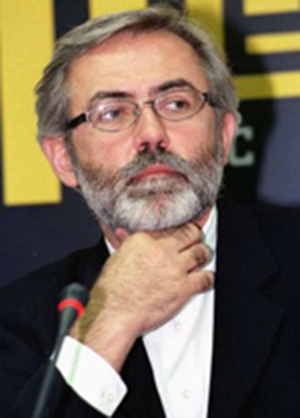8 Jan 2016 | Belarus, Greece, Hungary, Italy, Lithuania, Macedonia, Mapping Media Freedom, News, Poland, Portugal, Serbia, Turkey

The attacks on the offices of satirical magazine Charlie Hebdo in Paris in January set the tone for conditions for media professionals in 2015. Throughout the year, Index on Censorship’s Mapping Media Freedom correspondents verified a total of 745 violations of media freedom across Europe.
From the murders of journalists in Russia, Poland and Turkey to the growing threat posed by far-right extremists in Germany and government interference in Hungary — right down to the increasingly harsh legal measures imposed on reporters right across the continent — Mapping Media Freedom exposed many difficulties media workers face in simply doing their jobs.
“Last year was a tumultuous one for press freedom; from the attacks at Charlie Hebdo to the refugee crisis-related aggressions, Index observed many threats to the media across Europe,” said Hannah Machlin, Index on Censorship’s project officer for the Mapping Media Freedom project. “To highlight the important cases and trends of the year, we’ve asked our correspondents, who have been carefully monitoring the region, to discuss one violation each that stood out to them.”
Belarus / 19 verified reports between May-Dec 2015
Journalist blocked from shooting entrance to polling station
“It demonstrates the Belarusian authorities’ attitude to media as well as ‘transparency’ of the presidential election – the most important event in the current year.” — Ольга К.-Сехович
Greece / 15 verified reports in 2015
Four journalists detained and blocked from covering refugee operation
“This is important because it is typical ‘attempt to limit press freedom’, as the Union wrote in a statement and it is not very hopeful for the future. The way refugees and migrants are treated is very sensitive and media should not be prevented from covering this issue.” — Christina Vasilaki
Hungary / 57 verified reports in 2015
Serbian camera crew beaten by border police
“These physical attacks, the harsh treatment and detention of journalists are striking because the Hungarian government usually uses ‘soft censorship’ to control media and journalists, they rarely use brute force.” — Zoltan Sipos
Italy / 72 verified reports in 2015
Italian journalists face up to eight years in prison for corruption investigation
“I chose it because this case is really serious: the journalists Emiliano Fittipaldi and Gianluigi Nuzzi are facing up to eight years in prison for publishing books on corruption in the Vatican. This case could have a chilling effect on press freedom. It is really important that journalists investigate and they must be free to do that.” — Rossella Ricchiuti
Lithuania / 9 verified reports in 2015
Journalist repeatedly harassed and pushed out of local area
“I chose it because I found it relevant to my personal experience and the fellow journalist has been the only one to have responded to my hundreds of e-mails — including requests to fellow Lithuanian journalists to share their personal experience on media freedom.” — Linas Jegelevicius
Macedonia / 27 verified reports in 2015
Journalist publicly assaults another journalist
“I have chosen this incident because it best describes the recent trend not only in Macedonia and my other three designated countries, Croatia, Bosnia and Montenegro, but also in the whole region. And that is polarization among journalists, more and more verbal and, like in this unique case, physical assaults among colleagues. It best describes the ongoing trend where journalists are not united in safeguarding public interest but are nothing more than a tool in the hands of political and financial elites. It describes the division between pro-opposition and pro-government journalists. It is a clear example of absolute deviation from the journalistic ethic.” — Ilcho Cvetanoski
Poland / 11 verified reports in 2015
Law on public service broadcasting removes independence guarantees
“The new media law, which was passed through Poland`s two-chamber parliament in the last week of December, constitutes a severe threat to pluralism of opinions in Poland, as it is aimed at streamlining public media along the lines of the PiS party that holds the overall majority. The law is currently only awaiting president Duda’s signature, who is a close PiS ally.” — Martha Otwinowski
Portugal / 9 verified reports in 2015
Two-thirds of newspaper employees will be laid off
“It’s a clear picture of the media in Portugal, which depends on investors who show no interest in a healthy, well-informed democracy, but rather in how owning a newspaper can help them achieve their goals — and when these are not met they don’t hesitate to jump boat, leaving hundreds unemployed.” — João de Almeida Dias
Russia / 37 verified reports between May-Dec 2015
Media freedom NGO recognised as foreign agent, faces closure
“The most important trend of the 2015 in Russia is the continuing pressure over the civil society. More than 100 Russian civil rights advocacy NGOs were recognized as organisations acting as foreign agents which leads to double control and reporting, to intimidation and insulting of activists, e.g., by the state-owned media. Many of them faced large fines and were forced to closure.” — Andrey Kalikh
Russia / 37 verified reports between May-Dec 2015
TV2 loses counter claim to renew broadcasting license Roskomnadzor
“It illustrates the crackdown on independent local media, which can not fight against the state officials even if they have support from the audience and professional community.” — Ekaterina Buchneva
Serbia / 41 verified reports in 2015
Investigative journalist severely beaten with metal bars
“It’s a disgrace and a flash-back to Serbia’s dark past that a journalist, who’s well known for investigating high-level corruption, get’s beaten up with metal bars late at night by ‘unknown men’.” — Mitra Nazar
Turkey / 97 verified reports in 2015
Police storm offices of Koza İpek, interrupting broadcast
“The raid on Bugün and Kanaltürk’s offices just days ahead of parliamentary elections was a drastic example — broadcasts were cut by police and around 100 journalists ended up losing their jobs over the next month — of how the current Turkish government tries to strong-arm media organisations.” — Catherine Stupp
Mapping Media Freedom
Click on the bubbles to view reports or double-click to zoom in on specific regions. The full site can be accessed at https://mappingmediafreedom.org/
|
6 Jan 2016 | Mapping Media Freedom, mobile, News, Serbia

It was a Wednesday morning in early November when investigative journalist Slobodan Georgijev opened Informer, one of Serbia’s notorious tabloids. He had just arrived at his office, the newsroom of Balkan Investigative Reporting Network (BIRN), one of Serbia’s few independent media outlets. When he turned the page he was shocked by what he saw; a picture of his own face amongst two others, in an article calling three media outlets known for critical reporting of the Serbian government, including BIRN, “foreign spies”.
“It was funny and unpleasant at the same time,” Georgijev recalled, speaking to Index on Censorship. “Funny because I knew that this is just a campaign by Informer to undermine the credibility of independent journalists.” More importantly, he had begun worry about his own safety. “It’s also unpleasant because you never know how people will interpret such defamations.”
Several independent media houses — including BIRN, as well as Crime and Corruption Reporting Network (KRIK) and Center for Investigative Journalism Serbia (CINS) — have alleged that pro-government tabloids like Informer are running a smear campaign against them.
The first major incident followed the publication of a story about the cancellation of Prime Minister Aleksandar Vucic’s vacation in August 2015. Informer published an article saying that Vucic was forced to cancel his two day vacation in Serbia due to reporters from BIRN and CINS allegedly booking a room next to his.
The same newspaper also wrote that BIRN and CINS were meeting with European Union representatives on a weekly basis to plan to bring down the government.
“We are basically accused of being financed by the EU to work against our government,” Branko Cecen, director of CINS, told Index on Censorship. Cecen, like Georgiev, was also pictured and called a foreign spy in Informer. “Expressions like ‘foreign mercenaries’ and ‘joint criminal activity against their own state’ have been used.”
Informer newspaper is openly affiliated with the Serbian Progressive Party (SNS) of prime minister Aleksandar Vucic and has frequently been accused of political bias in favour of the party and the prime minister.
CINS, KRIK and BIRN have long reported on what they see as a slew of regular negative articles about themselves in tabloid newspapers with close ties to the government. There is no doubt that the three news outlets are targets because of their critical reporting on the government.
One of BIRN’s stories revealed a contract the Serbian government had signed with the national carrier of United Arab Emirates, Etihad Airways, to take over it’s state-owned counterpart Air Serbia. The deal had been financially damaging for Serbia, which was kept from the public until BIRN obtained and published the contract.
Another story investigated alleged corruption concerning a project for pumping out a flooded coal mine. BIRN found out that Serbia’s state-owned power company had awarded a contract to dewater the mine to a company who’s director is a close friend of the prime minister.
The coal mine revelations led to an angry speech about BIRN by Vucic on national television saying: “Tell those liars that they have lied again(.”
He also attacked the EU delegation in Serbia for being involved in discrediting the government by financing BIRN. “They got the money from Davenport and the EU to speak against the Serbian government,” the prime minister said, naming Michael Davenport, the head of the EU delegation in Belgrade.
BIRN’s editor-in-chief Gordana Igric told Index on Censorship she sees a resemblance to Serbia’s difficult nineties. “This reminds me of the regime of Slobodan Milosevic, a time when the prime minister also had a prominent role and critical journalists and NGOs were marked as foreign mercenaries,” she said. “What’s happening in Serbia today makes you feel sad and confused.”
Independent journalists find the path that the prime minister is taking alarming. Some compare him with the Turkey’s Recep Tayyip Erdoğan or the Russia’s Vladimir Putin. According to Cecen, the level of freedom of expression is at the lowest level since the time of strongman Milosevic. “There is an aggressive campaign against anybody and anything criticising the prime minister and his policies”, he said. “The prime minister has taken over most media in Serbia, especially national TV networks, but also local ones. His small army of social media commentators is terrorising the internet. It is quite bleak and frustrating.”
Regardless of Vucic’s verbal attacks towards the EU delegation, Serbia has opened the first two chapters in its EU membership negotiation in December 2015. This represents a big step towards eventual membership of the European Union. But the latest progress report on Serbia (November 2015) says the country needs to do much more in terms of fighting corruption, the independence of the judiciary and ensuring media freedom.
“The concern over freedom of expression is always expressed in these reports,” Cecen said. “But we see no influence of such reports since situation with media and freedom of expression is deteriorating daily.” Cecen is disappointed in the European Union’s support for independent media in Serbia and finds that EU officials show too much support for the Serbian government and the prime minister.
After he had seen his own face in the paper, Georgiev picked up the phone and called up Informer’s editor-in-chief Dragan Vučićević to ask for a better picture in the next paper. Georgiev jokes about it and clearly doesn’t let accusations and threats hold him back. “People around me are making jokes”, he said. “They call me a foreign mercenary, an enemy of the state.”
Georgiev pressed charges for defamation against Informer. “We are living in a state of constant emergency,” he continued, concerned about the state of press freedom in his country. “Serbia is not like Turkey. But it goes very fast in that direction.”
Mapping Media Freedom
Click on the bubbles to view reports or double-click to zoom in on specific regions. The full site can be accessed at https://mappingmediafreedom.org/
|
30 Oct 2015 | Europe and Central Asia, mobile, News, Serbia
The Association of Serbian Journalists reports that since 2013 there have been 65 attacks on Serbian journalists. Assailants in 11 of the incidents — around 17% of cases — have been prosecuted.
Believe it or not, a 17% conviction rate could be considered good news. But it isn’t enough.
International media organisations routinely assess that fewer than 10% of crimes committed against journalists worldwide result in prosecution. While the cavalier attitude by law enforcement and authorities to go after criminals gave rise to the phrase “impunity from prosecution,” many of us wonder if the term “immunity” might be more apt.
And that’s why I welcomed the initiative of Serbian authorities who, in early 2014, established a commission to support investigations into the deaths of Serbian journalists dating back to 1994, including Dada Vujasinović, Slavko Ćuruvija and Milan Pantić. In order to highlight the importance of their work and to raise the awareness of the importance of fighting impunity, my office supported the commission’s Chronicles of Threats campaign.
Ćuruvija, the owner of the newspaper Dnevni Telegraf and the magazine Evropljanin, was gunned down in front of his home in Belgrade in 1999. Thanks in part to the work of the commission, authorities re-opened the case last year and put four former state security officials under investigation for his murder. A trial is underway and while this is a start, his family and fellow journalists still need to see results.
This is why I why I wholeheartedly support all consciousness-raising efforts that take place on November 2 each year – the United Nations proclaimed International Day to End Impunity for Crimes Against Journalists which was initiated in 2013.
This landmark UN resolution condemns attacks on journalists and other media members. It also urges countries to do their utmost to prevent violence and make perpetrators accountable for their crimes, in order to promote a safe working environment.
But setting aside a day to cajole authorities to take the crimes against media seriously can only go so far. That is why the modest successes of the commission in Serbia provide a glimmer of hope that justice can be served.
But in order for societies to provide that safe working environment envisioned by the UN, a systematic array of steps must be undertaken at the local and national level. None of these steps are easy and their ability to succeed is questionable.
To begin with, local officials must be given the financial resources to conduct thorough investigations of all crimes committed. This is no small task in many of the 57 countries that comprise the Organization for Security and Co-operation in Europe — the region in which I work. Many of these nations have economies in transition, tax revenues are scarce and it’s a hard sell for authorities to suggest earmarking money to find justice for one class of victims when the needs of the whole community are not being adequately served.
Prosecutors and judges also need to be adequately trained to understand the importance of the fair application of existing criminal laws, especially when the rule of law in society is often buttressed only by a robust and independent media. This is the same media which is often critical of the prosecutors and judges who make up the judicial hierarchy.
In the end, getting past those hurdles may be seen, in retrospect, as the easiest steps. Because what’s really necessary to create a safe working environment is for society as a whole to accept that good journalism is necessary for a good society.
People must recognise that the free flow of information and ideas is essential in dynamic cultures and the secrecy and repression are antithetical to freedom and prosperity.
Creating a society where good journalism can flourish starts with making sure journalists can do their jobs and live to talk about it. And that means making sure that those who would run roughshod over journalists pay for their crimes.
This article was posted on 30 October 2015 at indexoncensorship.org
28 Sep 2015 | Europe and Central Asia, Hungary, Mapping Media Freedom, mobile, News, Serbia

At least eight journalists were beaten and three detained as they covered a clash between refugees and the Hungarian police at the border with Serbia on 16 September.
Among those attacked were Swedish photographer Meli Petersson Ellafi, Jordan Davis, a journalist at Swiss RTS, and an entire film crew working for Radio Television of Serbia. They were covering events at the Horgoš-Röszke highway border crossing, which the Hungarian authorities had blocked the day before, leaving around 2,000 refugees stranded on the Serbian side.
On 16 September, at around 2:30 PM local time, refugees attempted to break through a gate into Hungary. While most were protesting peacefully, a small number threw stones and bottles across the fence at the Hungarian riot police. The police responded with tear gas, pepper spray and water cannons.
“At some point, the riot police retreated from the fence and the refugees managed to open the gate,” Timea Becková, who works for Slovakian newspaper Denník N, recalls. Confusion followed, with many refugees thinking the Hungarian authorities would let them in, so they walked towards the riot police on the Hungarian side. Several dozen journalists on the Serbian side followed the crowd.
At around 5:30 PM, TEK, the Hungarian anti-terror SWAT unit, equipped with sidearms, helmets and face masks, started pushing the refugees back towards Serbia.
“As I was moving backwards, I stopped for a moment to help an old man who fell and risked being trodden by riot police, which is when an officer hit me with a baton,” Becková said. She repeatedly told police in Hungarian that she is a journalist, but it made no difference.
“Suddenly the TEK guys, not the riot police, started running towards us — it was mayhem,” says Warren Richardson, an Australian photographer. Despite having two cameras, he was grabbed from behind by an officer.
“Clearly he was there to beat, not to ask questions,” Richardson told Index on Censorship, adding that he was standing on ‘no mans’ land’ between Serbia and Hungary. “From there they beat me into Hungary, then took me from the border to the police station illegally. They kidnapped me.”
“Law enforcement lost control of the situation,” Becková said. While she doesn’t hold a grudge against TEK, she says the events that followed were outrageous. She was forcefully brought back to the Hungarian side — with her hands tied tightly with a plastic wrap — where she was thrown to the ground.
She was later handed over to the regular police along with Richardson, who was kicked in the head and chest, and the Polish journalist, Jacek Tacik, who suffered a head wound. They were taken to a police station in Szeged along with a number of detained refugees.
There they were questioned on suspicion of having crossed the border illegally. In addition, Becková was accused of inciting rebellion and Tacik was told he had assaulted a policeman. However, this accusation did not emerge again during his interrogation, he told Index.
During questioning, Richardson refused to cooperate. “I stood up for myself. They were making up laws. They never took my name, personal address or fingerprints,” he said.
After interrogations that lasted up to 13 hours, the journalists were released and the charges were dropped.
In a statement, the Hungarian police denied beating the journalists. “The police — in accordance with the law — used necessary and proportional force against the members of an aggressive group that was using instruments that could cause serious harm to the police protecting the border of Hungary and the European Union. The media workers stayed at their own risk in an area where the police — after a proper warning — used coercive instruments.”
Hungarian government spokesman Zoltan Kovacs said it was a surprise to find journalists among the chaos. He said that in situations like this, the safety of journalists cannot be guaranteed, therefore they should stay away. A policeman is not in the position to judge who is a troublemaker and who represents the media, he added.
The European Federation of Journalists (EFJ) has denounced the attack. “It is incomprehensible to see an EU country like Hungary constantly violating press freedom and human rights. The European Commission and international institutions must take action against these serious violations,” EFJ President Mogens Blicher Bjerregaard said.
“It is a prerequisite for EU member states to respect the EU Charter on fundamental rights which sets out standards on media freedom and freedom of expression.”
The incident was also condemned by the Committee to Protect Journalists. “We are appalled by the police violence against journalists covering this world story,” CPJ Europe and Central Asia Program Coordinator Nina Ognianova said. “The Hungarian government must make a clear and unequivocal statement that it will not tolerate such behavior.”
Mapping Media Freedom
Click on the bubbles to view reports or double-click to zoom in on specific regions. The full site can be accessed at https://mappingmediafreedom.org/
|
This article was published on 16 September 2015 at indexoncensorship.org




